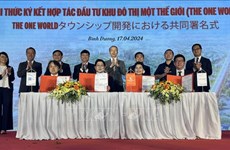Quality improvement needed to exploit Japan, Rok markets
Vietnam is hoping to make the most of its bright prospects in
agro-fishery exports to Japan and the Republic of Korea (RoK).
However, experts have warned that success to these promising markets is
only guaranteed if there is a rise in the quality of exported products.
Vietnam is hoping to make the most of its bright prospects in
agro-fishery exports to Japan and the Republic of Korea (RoK).
However, experts have warned that success to these promising markets is
only guaranteed if there is a rise in the quality of exported products.
Vietnam has enjoyed a number of advantages in penetrating the two markets. The Vietnam-Japan Economic Partnership Agreement and the ASEAN-RoK Free Trade Agreement, which offer a tax cut for Vietnamese products, will serve as “leverages” for the country’s exports.
In addition, a Vietnam-RoK free trade agreement is also expected to be signed this year.
In 2013, exports of agricultural products to Japan hit about 300 million USD, doubling the 2009 figure.
However, many batches of exported seafood have been sent back from Japan and the RoK due to below-par quality.
Currently, Japan is intensifying quality inspections over a number of agro-fishery products from Vietnam, especially fruits and frozen shrimp.
Only a few fruits from Vietnam have received an import permit from Japan. The Ministry of Health, Labour and Welfare of Japan has also decided to toughen inspection regulations on all shrimp originating from Vietnam, with a new maximum residue limit for ethoxyquin of 0.01 ppm. The RoK have since followed suit.
Meanwhile, Vietnam is also facing barriers from strict inspection regulations in the RoK market, especially on fruits and cattle meat. Strict requirements in quality plus the long procedure needed for inspection and risk assessment also pose difficulties for Vietnamese products.-VNA
Vietnam has enjoyed a number of advantages in penetrating the two markets. The Vietnam-Japan Economic Partnership Agreement and the ASEAN-RoK Free Trade Agreement, which offer a tax cut for Vietnamese products, will serve as “leverages” for the country’s exports.
In addition, a Vietnam-RoK free trade agreement is also expected to be signed this year.
In 2013, exports of agricultural products to Japan hit about 300 million USD, doubling the 2009 figure.
However, many batches of exported seafood have been sent back from Japan and the RoK due to below-par quality.
Currently, Japan is intensifying quality inspections over a number of agro-fishery products from Vietnam, especially fruits and frozen shrimp.
Only a few fruits from Vietnam have received an import permit from Japan. The Ministry of Health, Labour and Welfare of Japan has also decided to toughen inspection regulations on all shrimp originating from Vietnam, with a new maximum residue limit for ethoxyquin of 0.01 ppm. The RoK have since followed suit.
Meanwhile, Vietnam is also facing barriers from strict inspection regulations in the RoK market, especially on fruits and cattle meat. Strict requirements in quality plus the long procedure needed for inspection and risk assessment also pose difficulties for Vietnamese products.-VNA













